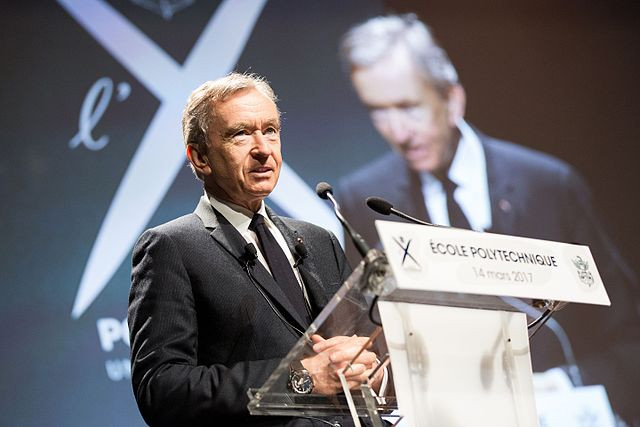French billionaire Bernard Arnault, chairman of LVMH, has reportedly acquired a stake in Swiss luxury conglomerate Richemont. This acquisition, reported by Bloomberg, has sparked speculation about Arnault's intentions and potential future moves in the high-stakes world of luxury brands.
The size of Arnault's stake in Richemont, which owns prestigious brands such as Cartier, Van Cleef & Arpels, and Chloé, remains undisclosed. However, the news has captured significant attention, with Richemont shares rising by 3%. Neither LVMH nor Richemont provided comments on the matter, keeping the transaction shrouded in secrecy.
This acquisition is particularly noteworthy given Arnault's history of strategic investments in rival companies. In 2010, LVMH disclosed it had built a substantial stake in Hermès, a move that met resistance from Hermès' family owners. The situation culminated in LVMH relinquishing its stake in 2014, but it demonstrated Arnault's willingness to make bold moves within the luxury sector.
Analysts suggest that this latest stake in Richemont may be part of a broader portfolio of investments held by the Arnault family. Kepler Cheuvreux analyst Jon Cox noted that while the investment appears personal, Arnault's admiration for Richemont's jewelry brands, particularly Cartier and Van Cleef & Arpels, is well-documented. "Arnault has made no secret that he thinks Richemont's Cartier and Van Cleef & Arpels are two world-class brands," Cox said. "I am sure LVMH is interested and has the financial resources to do a deal."
However, Richemont presents a formidable challenge for any potential takeover. The company is controlled by Chairman Johann Rupert through a dual-share structure that grants him 51% of the voting rights. Rupert has consistently expressed his desire to maintain Richemont's independence, a sentiment he reiterated in January when he described Arnault as an "outstanding leader" but emphasized his intention to stay independent. "If he wants support to maintain his independence, I'll be there," Arnault stated, echoing a more collaborative than combative approach.
Zuercher Kantonalbank analyst Patrik Schwendimann believes Arnault's ultimate goal could be to acquire Richemont to achieve market leadership in the jewelry sector. "This would be the missing jewel in his crown," Schwendimann remarked, though he acknowledged that any acquisition would need to be friendly. "He will never achieve this in a hostile manner. Bernard Arnault would have to convince Johann Rupert in a friendly manner."
Richemont's recent management overhaul, which saw Nicolas Bos, head of Van Cleef & Arpels, promoted to group CEO, indicates a strategic shift but does not diminish Rupert's influence. "I'm not stepping back but I'm asking Nicolas to assume some of the direct line reporting," Rupert, 74, clarified, indicating his continued involvement.
The backdrop of this development is a turbulent period for the luxury industry, marked by fluctuating market conditions and evolving consumer preferences. Despite these challenges, Richemont has posted strong financial results, with sales rising 8% year-on-year to €20.6 billion in the fiscal year ending March 31, 2024. This performance underscores the resilience and appeal of Richemont's brands, making it an attractive target for any strategic investor.
Neil Saunders, managing director and retail analyst at GlobalData, cautions against overinterpreting Arnault's stake. "The investment will naturally raise speculation about a potential takeover, but as it is a small personal stake, this is not likely to be the case," Saunders said. Nevertheless, he acknowledged that LVMH would be keen to acquire iconic brands like Cartier if the opportunity presented itself.





